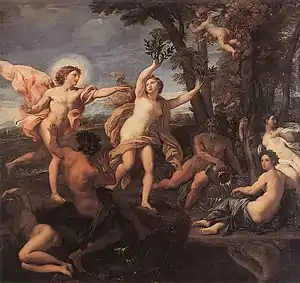Apollo e Dafne (Handel)
Apollo e Dafne (Apollo and Daphne, HWV 122) is a secular cantata composed by George Frideric Handel in 1709–10. Handel began composing the work in Venice in 1709 and completed it in Hanover after arriving in 1710 to take up his appointment as Kapellmeister to the Elector, the later King George I of Great Britain. The work is one of Handel's most ambitious cantatas and is indicative of the brilliant operatic career to follow in the next 30 years of his life.
The work's overture has not survived and therefore another of the composer's instrumental works is sometimes performed as an introduction. The cantata's instrumentation is bright, as Handel adds a flute, a pair of oboes and a bassoon to the usual strings.
The work takes just over 40 minutes to perform.
Synopsis

Apollo, having released Greece from tyranny by killing the menacing dragon Python, is in an arrogant mood. He boasts that even Cupid’s archery is no match for his own bow and arrow. When he sees the lovely Daphne his conceit is shattered. He is instantly smitten and deploys all his charms to win her favour. Naturally distrustful, she rejects his advances and declares that she would rather die than lose her honour. Apollo becomes more forceful in insisting that she yield to his love and takes hold of her. When all seems lost, Daphne manages to escape from his grasp by transforming herself into a laurel tree. Overwhelmed by sorrow, Apollo pledges that his tears will water her green leaves and that her triumphant branches will be used to crown the greatest heroes.
Summary
| Movement | Type | Voice | Text (complete) – translated from the original Italian |
|---|---|---|---|
| 1 | Overture | ||
| 2 | Recitative | Apollo | The earth is set free! Greece is avenged! Apollo has conquered! |
| 3 | Aria | Apollo | The good of the universe relies on this saving bow. |
| 4 | Recitative | Apollo | Let Cupid in his pretty pride give way to the force of my arrows; |
| 5 | Aria | Apollo | Break your bow and cast away your weapons, God of idleness and pleasure. |
| 6 | Aria | Daphne | Most blest is this soul, that loves only freedom. |
| 7 | Recitative | Apollo | What a voice! What a beauty! |
| Daphne | What do I see, alas? | ||
| Apollo | I am a God, whom your beauty has aroused | ||
| Daphne | I know no other God in these woods but only Diana; | ||
| Apollo | I am Cynthia's brother; | ||
| 8 | Aria | Daphne | You burn, adore, and beg in vain; only to Cynthia am I faithful. |
| 9 | Recitative | Apollo | How cruel! |
| Daphne | How importunate! | ||
| Apollo | I seek an end to my troubles. | ||
| Daphne | And I shall survive it. | ||
| Apollo | I am consumed with love | ||
| Daphne | I am burning with anger. | ||
| 10 | Duet | Apollo, Daphne |
A war rages in my breast that I can bear no longer. |
| Apollo | I burn, I freeze. | ||
| Daphne | I fear, I suffer. | ||
| 11 | Recitative | Apollo | Be calm now, my dear one. |
| 12 | Aria | Apollo | As the rose with its thorn quickly comes and quickly goes, |
| 13 | Recitative | Daphne | Ah! A God should follow after no other love than for objects eternal; |
| 14 | Aria | Daphne | As in gentle heaven the star of Neptune calms the storm, |
| 15 | Recitative | Apollo | Hear my reason! |
| Daphne | I am deaf! | ||
| Apollo | A bear you are, a tigress! | ||
| Daphne | You are no God! | ||
| Apollo | Yield to love, or you will feel my force. | ||
| Daphne | In my blood this ardour of yours will be quenched. | ||
| 16 | Duet | Apollo | Ah! Soften that harsh severity. |
| Daphne | To die is better than to lose my honour. | ||
| Apollo | Ah! Cease your anger, O beloved of my heart. | ||
| Daphne | To die is better than to lose my honour. | ||
| 17 | Recitative | Apollo | Always will I adore you! |
| Daphne | Always will I abhor you! | ||
| Apollo | You shall not escape me! | ||
| Daphne | Yes, I will escape you! | ||
| Apollo | I will follow you, run after you, fly in your steps: | ||
| 18 | Aria | Apollo | Run, my feet: hold tight, my arms, the ungrateful beauty. |
| 19 | Recitative | Apollo | Daphne, where are you? I cannot find you. |
| 20 | Aria | Apollo | Dear laurel, with my tears I shall water your green leaves; |
External links
- Apollo e Dafne, HWV 122: Scores at the International Music Score Library Project
